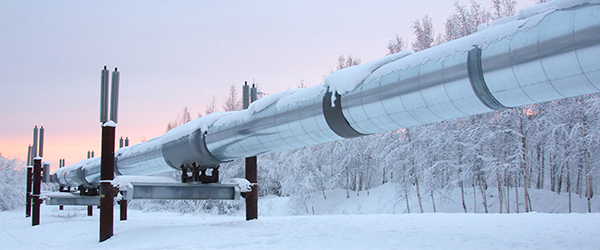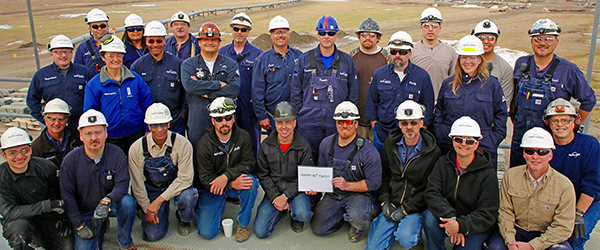Dave Roberts, Engineer
Long before Dave Roberts was modernizing TAPS, he was marveling at the iconic pipeline’s critical components. In the mid-80s, Dave’s dad was a mechanical engineer supplying Alyeska with mainline valves and Dave was a curious observer starting down his own engineering path.

“I was just a little kid in the shop watching them working on valves and valve actuators, the tubing,” said Dave. “I grew up in the oil patch, around the oil business.”
Over the past 20-plus years, Dave has grown up professionally around TAPS and Alyeska. He’s worked on some of the pipeline’s oldest infrastructure, including a few of those valves. Today, he crafts innovations that create a safer, smarter pipeline for the future.
With those deep industry roots and one of the organization’s most unique system views of TAPS, Dave is the 2020 Atigun Awards Engineer of the Year.
“It’s definitely appreciated to be recognized among the peer community as a leader, if you will, in this type of level of engagement with our work,” he said. “We are very energetic about our work at this company.”
High levels of enthusiasm, imagination and engineering savvy are prerequisites in his current role on the Appraise team, where conceptual engineers envision the future of TAPS.
“Our team works on fringe projects – technically challenging, global-type projects and longshot, game-changing types of studies,” he said. “You can’t have every group in the company chasing longshots. This is an operating company, designed around low risk. We identify the longshots and apply the rigor to them.”
Swinging for the fences creatively and conceptually comes with extreme results, from big-time successes that significantly impact safety, efficiency, operations and savings to investing years in projects that are suddenly scrapped when it’s clear they simply won’t work.
 “That’s why you engineer – you don’t cross your fingers and hope,” he said. “You do the conceptional work, work the research side of the fence and the practical side, too.”
“That’s why you engineer – you don’t cross your fingers and hope,” he said. “You do the conceptional work, work the research side of the fence and the practical side, too.”
One project imagined operating TAPS as a cold flow pipeline, allowing oil to drop below water’s freezing point, and developing a series of cold startup approaches. Those concepts stopped cold after years of work. Other ideas have included creating pressure-washing pigs that use brakes to provide ability to jet oil at the pipe wall to remove wax. They proved to be too risky. The team also developed pig washing infrastructure, or “hog washes,” to make wax removal at pump stations safer. That longshot hit the jackpot.
“We have a pig washing system at Pump 8 that is game-changing in our management of wax,” he said. Installation of a similar system at Pump Station 3 is expected in the future.
“The people who designed this over 40 years ago did an incredible job – they didn’t have computers or models for everything,” he said. “They did it by hand and overdesigned things, that’s why everything’s so robust. We don’t take any of it for granted. Optimizing how the old system works, creating new improvements and implementing them, that’s been exciting. But we’ve also found holes, redesigned things, and made them worse.”
Even before landing this role, Dave was innovating on TAPS.
After returning to Alaska from college and a brief engineering stint on the East Coast, he was hired by VECO, where he worked on TAPS projects with Alyeska engineers. In 1996, VECO sent the junior engineer to Valdez for a three-month assignment. He stayed nine years, six of them as an Alyeska employee, rising to automation engineer at the Terminal and system administrator who updated its control system.
Dave said, “We took a power plant that had a half dozen outages a year to now having an outage every few years.”
Since, he’s played key roles in other seminal TAPS projects, mostly out of Anchorage. He was so heavily involved in the TAPS Strategic Reconfiguration (SR) project that Alyeska moved him and his family to Edmonton, Canada, to work alongside a contractor’s SR experts for two years. He claims he was Alyeska’s first internationally-based employee.
“It was an epic experience,” he said. “My kids went to school there, rode the subway. It was a radical lifestyle change from Valdez.”
Years later, after returning to Alaska and getting most of the pump stations through SR startups, he shifted to his present position. The fascinating work, along with opportunities to mentor up-and-coming engineers and explore the outdoors along the pipeline route, keep him excited about the future of TAPS and his career.
 “When I hired on with VECO, I never could have guessed I would have worked with Alyeska for more than three years,” he said. “I always figured it would get boring – it’s just a pipe. How can there be that much interesting work in something running for so many years and it does just one thing? But there’s been challenge after challenge. That’s kept me engaged: the continual chase of new problems to solve.”
“When I hired on with VECO, I never could have guessed I would have worked with Alyeska for more than three years,” he said. “I always figured it would get boring – it’s just a pipe. How can there be that much interesting work in something running for so many years and it does just one thing? But there’s been challenge after challenge. That’s kept me engaged: the continual chase of new problems to solve.”
When there’s an issue to solve involving an aging valve, Dave knows who to call.
“Even as I’ve progressed in my career, my dad still has so much more experience,” he said. “Any time we have a valve problem, I just go to the source.”
Dave is now the source of inspiration that his dad continues to be for him, as there’s another future engineer in the family: “My son is studying engineering,” he said, “so we’ll keep passing the torch.”



